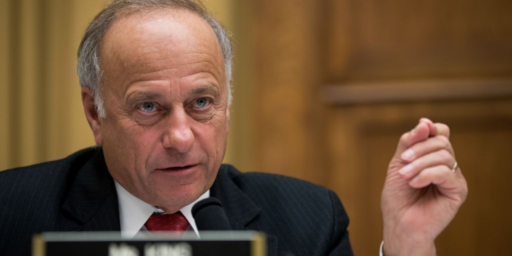A Quick Comment on Presidential Power
The pressure and expectations of a king, but with considerably less power.

James Joyner’s run-down on the recent spate of articles* about concerns about management within the White House sparks a few thoughts.
I think there are real issues that may be of concern, including Biden’s age and some issues linked to his management style (e.g., does he snap at people? does he take too much time deliberating?), but overall I think the problem we are seeing here is the presidency itself and, more broadly, the structure of our system. (And, really, these articles just all feel cliched and amplified by obvious issues, such as gas prices, mass shootings, the war in Ukraine, SCOTUS rulings, and the like).
Separated powers means that the president’s ability to act is limited, by definition. This is made worse by the structural design of the US Congress, which contributes to inaction on their part. Nonetheless, people want the president to be a king of some sort. The system so focuses our attention on the presidency (which is, after all, easier than trying to remember how Congress is supposed to work) and, by golly, we want him to do something! When the faux king is unable to do magic (he is supposed to be a wizard, too, dontcha know) then we get made about that, too.
Never mind that the president’s ability to do anything about gas prices, inflation in general, or abortion is pretty much zero.
And now is a good time to remind us all that the parties are weak (with the clearest manifestation of this being Sinema and Machin) and the power of the vote is blunted by non-competitive House seats and an unrepresentative Senate.
All of this is part of the deficit of representations that is my bedrock critique of the US government: there is no effective feedback loop within our politics, and this creates massive public frustration. This frustration is then focused on the president.
By the way: if anyone is still looking to understand why it is that first-term presidents almost always see their parties lose big at the mid-terms, this is why. It ends up that electing a new Magic President doesn’t mean that All the Things will be passed and so the support wanes for the occupant of the White House and his party. The cycle is almost a natural force of politics (and why, if the goal is governing, a two-year legislative cycle is a bad idea).
Indeed, as it pertains to the two-year cycle, that means that the whole of the House has been worried about re-nomination since the end of last year, give or take (and if they have been re-nominated at this point, it means most of them are guaranteed re-election in November, so what’s the big deal about, you know, governing?).
Further, and more concerningly, the above pressures drive us towards authoritarianism. If people already have overly-high expectations of the chief executive, and if the legislature is incapable of acting, then people will increasingly expect the executive to overstep its boundaries. These pressures erode the guardrails of elected government and invite politicians to claim that they “alone can fix it.”
*I started to read the CNN one yesterday, but when it started out with Debra Messing, I just quit.




I feel your pain. On my Yahoo news headlines feed, the click bait was “what Debra Messing says,” so I was able to dodge it.
The whole media framing thing drives me nuts. “Bill to keep guns out of the hands of people who assault their girlfriends fails to pass! Dems Lose and Republicans Win! Analysis: Why Biden Failed” Here in reality, no one wins, and women who didn’t see their boyfriends for the psychotic monsters they are lose most of all.
Biden was not my first choice to run in ’20.
I think he has done an outstanding job, considering both what he was handed and what came later.
He will not be my first choice to run in ’24.
See how easy that is?
Paragraphs 3-6, spot on. U.S. in a nutshell.
All politics is national, at least for Democrats. We have no game at the state legislature level, we don’t have a counterpart to White Evangelical churches, and we are riven by factions demanding Papa President snap his fingers and fix it all or they’ll stay home on election day and pout.
The Democratic Party has four core types: lawyers, academics, protesters and artists. People with JD’s, people with PhD’s, people with BA’s who don’t want to pay off their student loans, and people who assume that because they can play a role on TV they must be terribly wise. All people addicted to verbal communication, expressed either as impenetrable jargon, or dripping with condescension.
What are we missing? Workers. Soldiers. Entrepreneurs. Religious leaders. People who do, as opposed to people who think. Thinkers aren’t fighters. And do beats think.
The artists should be our ace-in-the-hole, professional communicators after all, who should be excellent propagandists. Nope. Our propagandists are oafs – rich, entitled oafs out-of-touch with the people – who just regurgitate whatever meme some college kid came up with, then award themselves a prize for courage.
Lawyers, academics, protesters and actors are not people who will do the down and dirty trench work at the city and county and precinct level, year-in and year-out. They aren’t people who know how to attract allies.
We spent 100% of our energy on the issue of abortion, fighting in courts. The opposition spent their energy organizing at the grass roots level. With one court decision our entire strategy simply disappeared. And yet, what do I hear? The lawyers are gonna take it to state courts! Because that’s sure to work. Other than that, um. . . blame Biden?
@Michael Reynolds: On the one hand, I agree as a general principle that the Dems need a better message to workers.
On the other, I think your assessment kind of ignores that the Dems are the majority party in terms of votes.
The notion that the Reps are a juggernaut and the Dems a bunch of hapless intellectuals is just another version of “Dems in disarray” (all of which is a variation on the messaging argument).
And while I think that it is fair to give the Reps credit for the Federalist Society as well as success at the state legislature level, I think this narrative of “Reps get things done” kind of ignores, for example:
1. The mathematical outcome of the 2016 election. That wasn’t a plan. (Not to mention 2000).
2. RBG’s stubbornness.
3. The timing of Scalia’s death.
None of that is the result of grassroots strategizing that could have been overcome with better behavior by the Dems.
@Michael Reynolds:
Your facts are all backwards. Roe was done in by huge donors and a small circle of Ivy League lawyers. The grass-roots protests were very ineffective. The right did not win because they convinced Obgyns that abortion is wrong. They did not convince Americans that abortion was wrong. They won because they funded the Federalist Society, which was the easiest thing in the world to do. It’s like the difference between being a climate ‘sceptic’ who writes a thousand-word op-ed in the WSJ about climate hysteria and an actual scientist spending five years studying ice core samples.
The central problem for the Democrats is that they do the actual public work in this country. Republicans don’t. Aside from grasping power and making money, they don’t do a thing for the public. After the WASPs left, the Republican Party became Trump and Buchanan–just small business guys, family business goons, cops, and Christians who cheat and lie about everything and then blame the government if they’re caught.
@Steven L. Taylor:
Even before 2016, the GOP was already dominating most state governments around the country. Part of that can be attributed to the natural tendency of the out-party to the White House to do well in off-years, but it’s also due to superior organizing. Dems only partly regained their strength in this area during Trump’s term. A majority of states are still Republican-run at the state level.
As for RBG’s stubbornness, that can’t be considered in isolation, as just the whim of one individual. She was ensconced in a culture of respectability politics that dominates much of the liberal scholarly world, and which still makes people like her (such as the recently retired Breyer who had to be heavily pressured before he agreed to step down, and Sotomayor with her recent soliloquy of effusive praise toward Clarence Thomas) blind to the cutthroat nature of the GOP today.
One of the things that Republicans do is keep things simple (there’s that messaging argument again). George W. Bush (with Karl Rove) really just tried to campaign on just four items. It provided clarity to the voters. Democrats, it seems to me, want (or have to) please many constituencies and their messaging (or image or whatever) is muddied. They also get easily dragged into small stuff (like Brittany Griner) that distracts. When they beat the healthcare drum almost exclusively, they won.
@Scott:
It isn’t just a matter of messaging. Their proposals–the things they set out to do when they get into power–are in fact simpler than the things Dems set out to do. Furthermore, if Dems were to attempt to dumb things down on their side and embrace simpler solutions, that wouldn’t necessarily be to their political advantage. You really think Dems would be in a better position if they all embraced “open borders”?
@Kylopod:
I was reading through the Democrat Platform Planks before your comment.
They don’t have “a platform”. They have a treehouse designed by MC Escher.
* PROTECTING AMERICANS AND RECOVERING FROM THE COVID-19 PANDEMIC
* BUILDING A STRONGER, FAIRER ECONOMY
* ACHIEVING UNIVERSAL, AFFORDABLE, QUALITY HEALTH CARE
* PROTECTING COMMUNITIES AND BUILDING TRUST BY REFORMING OUR CRIMINAL JUSTICE SYSTEM
* HEALING THE SOUL OF AMERICA
* COMBATING THE CLIMATE CRISIS AND PURSUING ENVIRONMENTAL JUSTICE
* RESTORING AND STRENGTHENING OUR DEMOCRACY
* CREATING A 21ST CENTURY IMMIGRATION SYSTEM
* PROVIDING A WORLD-CLASS EDUCATION IN EVERY ZIP CODE
* RENEWING AMERICAN LEADERSHIP
Each one of those has enough timber underneath to float the Spanish Armada. And that’s without getting into BS statements like “healing the soul of America”–which includes some laudable items, but which is filled with impossible goals such as “ending violence against women”. This one “plank” has 11 different sections–many of which have zero to do with each other.
I might get drunk enough to read through the entire novel later, but that one section alone is 10-pages long! (4873 words according to MS Word).
Jezzus Christ, people! Pick 5 things–that really matter to people and that you can actually accomplish–and hammer on them. You need something that fits on a billboard, not in a leather-bound trilogy.
@Kylopod:
Or, more likely, the natural tendency of legislatures to over-represent less urban districts in systems that elect via single-seat plurality. I know that there is a narrative that the GOP paid a lot more attention to those issues, but I am less convinced that that narrative is quite as accurate as is suggested. I am not saying it is wrong, but I think that the overall structure of the system tilts in their favor, which then has a ripple effect (e.g., gerrymandering).
@Kylopod:
Well, first it was an example of the capricious nature of political reality that could not be attributed to GOP strategizing. Second, it was also not strategy, as much as happenstance that gave Trump, a PV loser, three SCOTUS seats.
And I don’t know that RGB’s behavior had much to do with the ensconcement you note as much as it is just hard for people to know when it is time to quit (and that generation in particular).
@Mu Yixiao: While I don’t disagree with your general point, the reality is that American party platforms are essentially meaningless. Parties can’t enforce them and they are even written to be used as campaign documents.
@Scott: @Kylopod:
Republicans, through their media ecosystem, TARGET their narratives on THE MEDIUMS rural voters consume.
Shorter: Rs drop their bait around the rocks and lily pads the fish live around. You can have a great bait…but if you don’t put it where the fish hide you won’t connect. Hell, if the fish is hungry enough, you can drop a shitty offering in there and still be successful.
There are enough rural Democrats and Black evangelicals in Red States to Focus Group the rural and evangelical translations of Democrat themes. Messaging is not a problem. The problem is a lack of Will to message in the electromagnetic spectrum where rural and semi-rural folk live–through the appropriate mouthpieces esteemed by that culture.
@Modulo Myself: Au Contraire… they did organize. Through a network of Evangelical megachurches and media corporations. The only formidable Religious group historically who had moral objection with the Roe compromise were Catholics. Cue the White Evangelicals. All of this Rw fuckery is brought to you courtesy of this Alliance. It was forged on purpose and, frankly, must be divided on purpose.
That won’t happen if the only radio, preaching, billboards, and social media is from the RW outrage machine. These aren’t blatantly “vote Republican” messages. They’re messages that support the Republican narrative of “6 minutes til Midnight…we’re your only shot”.
For example, The ratio of “Abortion Holocaust ” Billboards to Womens Health Billboards Ive seen driving through the rural Southeast is 100 – 0. Im not exaggerating….ZERO.
@Steven L. Taylor:
Then why have them?
Oh… That’s right: To make themselves feel good.
The “even” in that sentence throws me. Was there supposed to be an “aren’t” preceeding?
Either way:
a) It shows that Democrats absolutely suck at not only messaging, but at creating a concise, coherent, and achievable platform.
b) It shows that the Democratic party doesn’t know how to hire a marketing firm–which (to me) shows that they’re incompetent in management (prioritizing, marketing/messaging, delegating, etc.)
c) It means they’re going to lose–even though they have majority support. And this has nothing to do with gerrymandering or the EC. They’re going to lose because they can’t figure out how to get enough of the people who currently agree with them to get off their asses and vote. Alka-Seltzer saw their sales double because of the jingle “plop plop, fizz fizz”[1]. Trump had a great catch-phrase–one that could be put on bumper stickers, hat, and t-shirts. The Dems? They have an official word salad that “strives for” things that everyone knows are impossible, and sounds like a college lecture.
d) The Democratic party absolutely has the power to say “If you don’t campaign on and adhere to the following five planks, you will receive zero funding, endorsement, or support from the Democratic Party or any of its member[2]”. Power of the purse strings. Outside those five planks, let candidates tailor their campaigns to local needs (encourage it!), but keep the core.
Anecdote before I head out to old-people night at the wine bar:
I used to work in marketing and PR. I know how to build a campaign that will attract and engage people. I also know what to avoid. During my “transition” out of Chin[3], I had the only discussion in my business dealings there where I lost my temper. I was the Director of Marketing. The new “sales manager” kept insisting that all of the sales team should have access to post to all of the company’s social media accounts. I kept rejecting it. After repeated prodding as to why, I finally lost it and yelled “Because they’ll fuck it up!!”[4]
A month or so before, one of the sales team had posted on social media our logo, several photos of our product, and a photo of Osama bin Laden–with the caption “He’s a smart man. He’d love our products.”
========
[1] One Alka-Seltzer will do the job just fine. The ad campaign, combined with a packaging change (two in a sachet instead of one), doubled sales.
[2] Use the same threat with current members to make it happen.
[3] i.e., “how to escape with the least damage to myself”
[4] My (German) GM came in after the meeting to ask if I was okay. I explained why I blew up and he just nodded, took a couple chocolates from the dish on my desk and went back to his office next door. 🙂